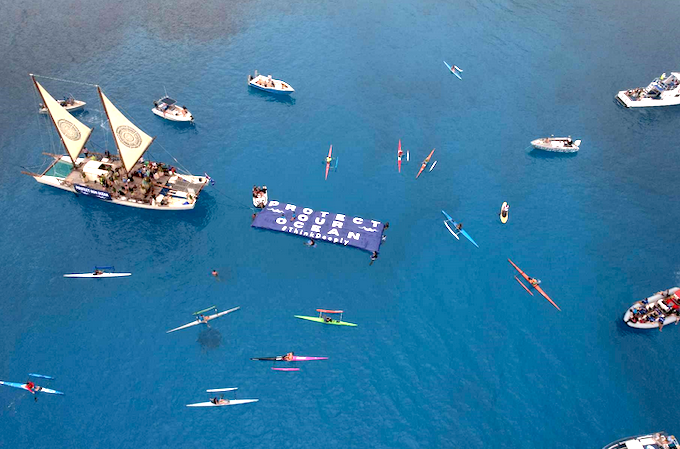
By Losirene Lacanivalu, of the Cook Islands News
A leading Cook Islands environmental lobby group is hoping that the Cook Islands government will speak out against the recent executive order from US President Donald Trump aimed at fast-tracking seabed mining.
Te Ipukarea Society (TIS) says the arrogance of US president Trump to think that he could break international law by authorising deep seabed mining in international waters was “astounding”, and an action of a “bully”.
Trump signed the America’s Offshore Critical Minerals and Resources order late last month, directing the National Oceanic and Atmospheric Administration (NOAA) to allow deep sea mining permits.
- READ MORE: Trump’s push on deep sea mining leaves Nauru’s commercial ambitions ‘out in cold’
- Other seabed mining reports
The order states: “It is the policy of the US to advance United States leadership in seabed mineral development.”
NOAA has been directed to, within 60 days, “expedite the process for reviewing and issuing seabed mineral exploration licenses and commercial recovery permits in areas beyond national jurisdiction under the Deep Seabed Hard Mineral Resources Act.”
It directs the US science and environmental agency to expedite permits for companies to mine the ocean floor in the US and international waters.
In addition, a Canadian mining company — The Metals Company — has indicated that they have applied for a permit from Trump’s administration to start commercially mining in international waters.
The mining company had been unsuccessful in gaining a commercial mining licence through the International Seabed Authority (ISA).
‘Arrogance of Trump’
Te Ipukarea Society’s technical director Kelvin Passfield told Cook Islands News: “The arrogance of Donald Trump to think that he can break international law by authorising deep seabed mining in international waters is astounding.
“The United States cannot pick and choose which aspects of the United Nations Law of the Sea it will follow, and which ones it will ignore. This is the action of a bully,” he said.
“It is reckless and completely dismissive of the international rule of law. At the moment we have 169 countries, plus the European Union, all recognising international law under the International Seabed Authority.
“For one country to start making new international rules for themselves is a dangerous notion, especially if it leads to other States thinking they too can also breach international law with no consequences,” he said.
TIS president June Hosking said the fact that a part of the Pacific (CCZ) was carved up and shared between nations all over the world was yet another example of “blatantly disregarding or overriding indigenous rights”.
“I can understand why something had to be done to protect the high seas from rogues having a ‘free for all’, but it should have been Pacific indigenous and first nations groups, within and bordering the Pacific, who decided what happened to the high seas.
“That’s the first nations groups, not for example, the USA as it is today.”
South American countries worried
Hosking highlighted that at the March International Seabed Authority (ISA) assembly she attended it was obvious that South American countries were worried.
“Many have called for a moratorium. Portugal rightly pointed out that we were all there, at great cost, just for a commercial activity. The delegate said, ‘We must ask ourselves how does this really benefit all of humankind?’
Looking at The Metals Company’s interests to commercially mine in international waters, Hosking said, “I couldn’t help being annoyed that all this talk assumes mining will happen.
“ISA was formed at a time when things were assumed about the deep sea e.g. it’s just a desert down there, nothing was known for sure, we didn’t speak of climate crisis, waste crisis and other crises now evident.
“The ISA mandate is ‘to ensure the effective protection of the marine environment from the harmful effects that may arise from deep seabed related activities.
“We know much more (but still not enough) to consider that effective protection of the marine environment may require it to be declared a ‘no go zone’, to be left untouched for the good of humankind,” she added.
Meanwhile, technical director Passfield also added, “The audacity of The Metals Company (TMC) to think they can flaunt international law in order to get an illegal mining licence from the United States to start seabed mining in international waters is a sad reflection of the morality of Gerard Barron and others in charge of TMC.
‘What stops other countries?’
“If the USA is allowed to authorise mining in international waters under a domestic US law, what is stopping any other country in the world from enacting legislation and doing the same?”
He said that while the Metals Company may be frustrated at the amount of time that the International Seabed Authority is taking to finalise mining rules for deep seabed mining, “we are sure they fully understand that this is for good reason. The potentially disastrous impacts of mining our deep ocean seabed need to be better understood, and this takes time.”
He said that technology and infrastructure to mine is not in place yet.
“We need to take as much time as we need to ensure that if mining proceeds, it does not cause serious damage to our ocean. Their attempts to rush the process are selfish, greedy, and driven purely by a desire to profit at any cost to the environment.
“We hope that the Cook Islands Government speaks out against this abuse of international law by the United States.” Cook Islands News has reached out to the Office of the Prime Minister and Seabed Minerals Authority (SBMA) for comment.
Republished from the Cook Islands News with permission.














































